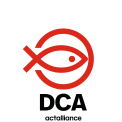DanChurchAid has posted 1 jobs
DanChurchAid (Danish: Folkekirkens Nødhjælp) is a Danish humanitarian non governmental organization aimed at supporting the world's poorest people. It is rooted in the Danish National Evangelical Lutheran Church and is a member of ACT Development
In 2011 it had a total income of DKK 528.7 million, including 107.3 million in EU grants.
DanChurchAid’s stated aim is "to strengthen the world’s poorest people in their struggle for a life in dignity"
DanChurchAid believes that all human beings are created in the image of God and therefore equal; that even the poorest of the poor have capacities to build on, and that assistance should be given regardless of race, religion and political affiliation.
Danchurchaid In The Act Alliance
ACT is an abbreviation for Action by Churches Together. As indicated in DanChurchAid's logo, where the ACT Alliance name is incorporated, ACT is the most important of the many alliances and networks to which DCA belongs.
Basic Facts About The Act Alliance
- ACT Alliance is composed of more than 110 member organisations working in long-term development and humanitarian assistance
- Members work in 130 countries
- Members employ around 30,000 staff and volunteers
- Members mobilise approximately $1.5 billion each year
- The alliance is supported by an international Secretariat of some 20 staff based in Geneva
- The alliance was created on 1 January 2010 by bringing together the efforts, resources, people and organisations who have been working together since 1995 as ACT International and since 2003 as ACT Development.
Our Role In The Act Alliance
With a Secretariat of only 20 staff to support the 110 members working in 130 countries, it is clear that the work and input from members is the key to establishing and maintaining ACT as a unity.
It is highly prioritised in DCA to contribute to building a strong alliance. Therefore, we invest a lot of time in being active and committed participants at various levels: Our General Secretary is member of the Governing Board; we are full members in four working groups and observers in five others; our regional offices are always instrumental in the national and regional ACT Forums; the majority of our emergency work is done with other ACT members; and as an organisation we always give input to new policies as well as relevant technical guidelines.


